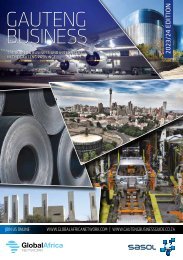South African Business 2019 edition
The 2019 edition of South African Business is the seventh edition of this annual guide to business and investment in South Africa. Regular pages cover all the main economic sectors of the South African economy and give a snapshot of each of the country’s provincial economies. Feature articles on topical issues such as Special Economic Zones and African trade provide unique insights, together with comprehensive overviews of critical economic sectors. Other special features focus on the exciting new possibilities in renewable energy, airports as engines of regional growth and the maritime sector as an entirely new prospect for South African entrepreneurs and businesses. South African Business is complemented by nine regional publications covering the business and investment environment in each of South Africa’s provinces. The e-book editions can be viewed at www.globalafricanetwork.com
The 2019 edition of South African Business is the seventh edition of this annual guide to business and investment in South Africa.
Regular pages cover all the main economic sectors of the South African economy and give a snapshot of each of the country’s provincial economies. Feature articles on topical issues such as Special Economic Zones and African trade provide unique insights, together with comprehensive overviews of critical economic sectors. Other special features focus on the exciting new possibilities in renewable energy, airports as engines of regional growth and the maritime sector as an entirely new prospect for South African entrepreneurs and businesses.
South African Business is complemented by nine regional publications covering the business and investment environment in each of South Africa’s provinces. The e-book editions can be viewed at www.globalafricanetwork.com
Create successful ePaper yourself
Turn your PDF publications into a flip-book with our unique Google optimized e-Paper software.
OVERVIEW<br />
where investment will pay off are bringing under-utilised land (in<br />
communal areas and land reform farms) into commercial production,<br />
expanding irrigation schemes and targeting areas that have<br />
the highest potential for growth.<br />
Fruit, sugar and wine make up about 7% of the country’s total export<br />
basket. Avocadoes, tomatoes and macadamias are among other<br />
important export crops. Primary agriculture provides 5% of formal<br />
employment in <strong>South</strong> Africa.<br />
Several of the Special Economic Zones around <strong>South</strong> Africa either<br />
have or will in the future have, agri-processing facilities. Examples<br />
include existing tomato paste and dairy facilities at Coega IDZ and<br />
plans to develop the SEZ at Harrismith (Maluti-A-Phofung) into a hub<br />
for agri-processing. The Nkomazi SEZ in Mpumalanga will promote<br />
agri-processing and the Mpumalanga International Fresh Produce<br />
Market currently under construction in Mbombela will boost the<br />
agricultural sector in the region.<br />
ONLINE RESOURCES<br />
Agricultural Research Council: www.arc.agric.za<br />
Fresh Produce Exporters’ Forum: www.fpef.co.za<br />
Grain SA: www.grainsa.co.za<br />
National Department of Agriculture, Forestry and Fisheries:<br />
www.daff.gov.za<br />
SA Table Grape Industry: www.satgi.co.za<br />
Agricultural variety<br />
A total of 70% of <strong>South</strong> Africa’s<br />
grain production is maize, which<br />
covers 60% of the cropping area<br />
of the country. The <strong>South</strong> Africa<br />
feed industry has an annual<br />
turnover of about R50-billion with<br />
most of the raw material being<br />
soya and maize.<br />
KwaZulu-Natal and<br />
Mpumalanga produce sugar,<br />
but volumes are down. The Free<br />
State Province supplies significant<br />
proportions of the nation’s<br />
sorghum, sunflower, potatoes,<br />
groundnuts, dry beans, and almost<br />
all of its cherries.<br />
Products distinctive to<br />
<strong>South</strong> Africa, such as rooibos<br />
tea (Western Cape) and marula<br />
berries (Limpopo) hold great potential<br />
to capture niche markets<br />
internationally.<br />
<strong>South</strong> Africa is famous for its<br />
fruit, of which 35% is citrus, 23%<br />
subtropical and nuts, 26% pome<br />
fruIt, 11% stone fruit and 9% table<br />
grapes. Export volumes, particularly<br />
in tropical fruits such as<br />
mangoes and avocadoes, have<br />
been growing rapidly. Most of<br />
<strong>South</strong> Africa’s citrus and subtropical<br />
fruit comes from the eastern<br />
part of Limpopo.<br />
There are about 3 500 wine<br />
producers in <strong>South</strong> Africa, with<br />
the large majority located in the<br />
Western Cape. The industry earned<br />
R17.5-billion in exports in 2016.<br />
Livestock farming is the largest<br />
agricultural subsector in <strong>South</strong><br />
Africa and the Eastern Cape is the<br />
largest livestock province. <strong>South</strong><br />
Africa has a beef-herd of 14-million.<br />
<strong>South</strong> Africa produces about<br />
55% of the world’s mohair.<br />
SOUTH AFRICAN BUSINESS <strong>2019</strong><br />
68


















